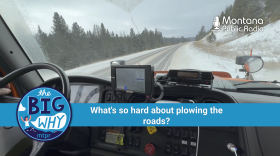Austin Amestoy: Welcome to the Big Why, a series from Montana Public Radio where we find out what we can discover together. I’m your host, Austin Amestoy. This is a show about listener-powered reporting. We’ll answer questions — large or small — about anything under the Big Sky. By Montanans, for Montana, this is The Big Why.
This time around, we’re unpacking an answer to a tricky education question. Joining me on this episode is MTPR producer Nick Mott. Good to have you here, Nick!
Nick Mott: Great to be here, Austin.
Austin Amestoy: Today’s question comes to us from graduate student Jordan Straub.
Jordan Straub: “Why is Montana ranked one of the last in the nation for teacher salary, and how might this be changing in the next legislative session?”
Austin Amestoy: Straub is 24, and she’s finishing up her master’s degree in education in New York.
Jordan Straub: “I am from Montana, I feel very called to teach in the community that I grew up in.”
Austin Amestoy: She started her job hunt earlier this year.
Jordan Straub: “And, I was really, really discouraged.”
Nick Mott: Based on her question, I’m guessing the starting salaries weren’t what she had hoped?
Austin Amestoy: Exactly. Straub told me wages for new public school teachers in Montana were sharply lower than what she saw listed in other states.
Jordan Straub: “That’s hard, to think about being where I want to be and considering whether or not I’ll be able to make that work financially.”
Austin Amestoy: Nick, many others in Straub’s position are asking themselves the same question — whether teaching in Montana is worth it. The state education department recently released some striking numbers: More than 1,200 educators left the field entirely in Montana in 2022. And nearly a third of Montana teachers leave within their first year of licensure.
Nick Mott: Wow, those are some remarkable figures. Do we know why teachers ultimately leave their careers?
Austin Amestoy: We don’t have really granular data on that, Nick. I can tell you that a big reason that comes up in policy discussions about teacher retention is low pay.
To fully answer Jordan’s question, I figured we’d break it into two parts. First, we’ll talk about the state of teacher pay in Montana. After that, we’ll get into what lawmakers might do to boost pay going forward. How does that sound?
Nick Mott: That sounds like a good roadmap. Straub’s question says Montana is ranked as one of the last states in the nation in terms of teacher pay. Is that true?
Austin Amestoy: Well, Nick, as of June 2024, the answer to that question got a lot more complicated. For many years, the only solid data on teacher pay in Montana came from the National Education Association, or NEA.
That group tracks pay in all 50 states and Washington D.C., and for several years in a row now, it’s ranked Montana 51st in the nation for starting teacher wages, and 42nd for average salary.

https://www.nea.org/resource-library/educator-pay-and-student-spending-how-does-your-state-rank
Nick Mott: But?
Austin Amestoy: Yeah, here’s that complication — state lawmakers asked the Montana Department of Labor and Industry to study teacher pay, and the department presented some early results in mid-June that show wages are substantially higher than the NEA’s data.
Nick Mott: Interesting — how big is the difference?
Austin Amestoy: The NEA says new teachers in Montana make a little more than $34,000 on average. The state labor department’s average is more than $43,000 — a difference of nearly 10 grand.
The findings drew some sharp reactions from a few state lawmakers. Rep. David Bedey is a Republican representing Hamilton. He’s a major player in state education policy.
David Bedey: “This notion that Montana is 51st in the nation in terms of teacher salaries is, number one, incorrect, and it’s harmful.”
Nick Mott: What did Bedey mean by that?
Austin Amestoy: Well, Bedey told me that statistic is likely dissuading potential teachers from taking jobs in Montana.
I should note here that the Montana Federation of Public Employees, which reports teacher pay information to the NEA, stands by that ranking and its data.
Despite their differences over data, though, lawmakers — including Bedey — and education advocates are still generally in agreement: teacher pay is too low, and the Legislature needs to help give it a boost.
Nick Mott: So, almost everyone agrees there’s a problem with low teacher pay in Montana. What do folks think is causing that problem?
Austin Amestoy: Well, in a word:
David Bedey: “Inflation.”
Melissa Romano: “Inflation.”
Amanda Curtis: “Inflation.”
Nick Mott: Right, prices have been going up for just about everything in the last few years. What kind of impact is that having on teacher pay?
Austin Amestoy: A huge impact, Nick. As prices go up, so do costs for schools — think food, utilities, technology and materials. The national rate of inflation went as high as 6.5% in 2022 and has stayed stubbornly high. And, that’s a problem because:
Amanda Curtis: “The State has not funded schools at a level that has kept up with just the basic rate of inflation.”
“The State has not funded schools at a level that has kept up with just the basic rate of inflation.”Amanda Curtis
Austin Amestoy: That’s Amanda Curtis. She’s the president of the Montana Federation of Public Employees, the union that represents public school teachers. And, Curtis isn’t really stating an *opinion, there — lawmakers on both sides of the aisle generally agree that the state funding formula for schools fell way behind inflation in the last few years.
Nick Mott: Well, it’s the union’s job to negotiate teacher pay. Did Curtis tell you how that's going?
Austin Amestoy: Curtis says bargaining has been difficult in recent years, largely because school budgets have been stretched to the limit. She says schools have been forced to choose between paying their basic costs and paying their *teachers a higher wage.
Some of the largest districts in the state, like Missoula and Helena, cut dozens of teaching positions this spring just to balance the books. When schools cut teachers, that leaves little room for raising pay.
Nick Mott: Why doesn’t the Legislature just give public schools a funding boost, then?
Austin Amestoy: That question is hard to answer, Nick. We quickly get into politics, which have a tendency to cloud up the conversation around policy — the actual solutions.
I’m simplifying a bit here, but current state law essentially allows school funding to grow by a maximum of 3% each year. Remember, the rate of inflation peaked at more than double that in the last few years.
Rep. Melissa Romano, a Democrat representing part of Helena, says there was talk when lawmakers met in 2023 about revising that cap, but it didn’t go anywhere.
Melissa Romano: “We tend to be reactionary instead of proactive. Everything seems to move slowly, and it’s hard when schools need the money now.”
Austin Amestoy: But, that could change next session. Romano and Bedey both told me they think boosting teacher pay will be a hot issue at the next Legislature, which meets in January.
Nick Mott: Right, the second part of our question — what might lawmakers do to help raise teacher pay?
Austin Amestoy: I’ll start by saying that we’ll have a clearer answer to that question in a few months
That said, I did get some clues about what we might see. Rep. Bedey told me his interim budget committee is in the early stages of drafting a bill that would revise the limit on how much school budgets can grow. That could help schools offset the rising costs we talked about earlier.
David Bedey: “Now, is the ultimate solution for school funding? I can’t say — it might be.”
Austin Amestoy: But, if it isn’t the ultimate solution, Bedey says lawmakers will have to take a long, hard look at the school funding formula starting next year.
The Montana Constitution requires lawmakers to meet every 10 years to study the financial needs of the public school system and suggest changes to the funding formula if necessary. You can expect teacher pay to be a big part of that conversation.
The Montana Constitution requires lawmakers to meet every 10 years to study the financial needs of the public school system and suggest changes to the funding formula if necessary. You can expect teacher pay to be a big part of that conversation.
Nick Mott: That sounds promising for sure. But, I’m still thinking about those stats you shared at the beginning, about how many teachers are leaving the profession. It sounds like it will take awhile for teacher pay to improve, and there are a lot of “ifs” before we get there.
What about our question-asker, Jordan Straub? How did her job hunt go?
Austin Amestoy: A glimmer of hope to end this story, Nick — Straub told me she eventually found a job in West Yellowstone that will allow her to be close to her family.
Jordan Straub: “That outweighed that pay gap, for me. But, I’m a unique case, and I don’t know if everyone else would necessarily make the same decision I did.”
Austin Amestoy: I think it’s safe to say we can expect to see lawmakers put a good amount of energy toward closing that pay gap in the months and years ahead.
Nick Mott: I know you’ll be covering those efforts for us, Austin. Thanks for your reporting!
Austin Amestoy: Anytime, Nick.
Austin Amestoy: Now we want to know what makes you curious about Montana. This election year, we’re especially interested in hearing your questions about the Montana candidates, campaigns and the policies at stake.
Find us wherever you listen to podcasts and help others find the show by sharing it and leaving a review. Let's see what we can discover together!
-
Pencils down! Does that phrase bring back some anxiety-inducing memories? What if, like in your bad dreams, it's an exam you haven't studied for? A listener wants to know why student test scores have stopped rising. The answer involves triangles and time. Learn more in this lesson of The Big Why. There won't be a quiz afterward.
-
Elk are a familiar sight in much of Montana now, but that hasn't always been the case. By the early 1900s, unregulated hunting had led to massive declines in wildlife nationwide. But In Yellowstone, elk populations were exploding thanks to protections in place there. The solution to restoring elk outside the park seemed obvious. Less obvious was how to make it happen. This week on the Big Why, we trace the animals' bumpy path from the living laboratory called Yellowstone Park to the Bitterroot Valley and beyond.
-
If you’ve been to a taproom, you know that at most breweries across the state there’s a three pint limit and they stop serving at 8 p.m. One listener wants to know why. We've got answers. Pull up a stool, crack open a local brew and settle in for a taproom tale – or some barroom banter, depending on the time of day.
-
When it comes to winter driving, everyone wants their route clear and dry, and they want it done quickly. Why don't the plows come sooner or more often? Why don't they drop more salt or deicer? Why not get more drivers on the road? Tag along as a Montana snowplow driver prepares for a big winter storm and find out more about the logistical, environmental and technical challenges that come with keeping the roads clear of snow.
-
How do cabbage and spices become ingredients for community building? In Korea, the answer is kimjang, the fall tradition of making and sharing kimchi. This week on The Big Why, we visit a farm in the Bitterroot Valley where a group of Montanans came together to keep a food custom alive and find comfort and connection among the cabbage.










